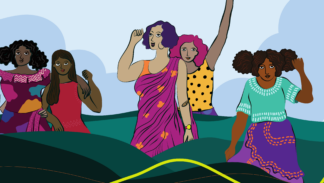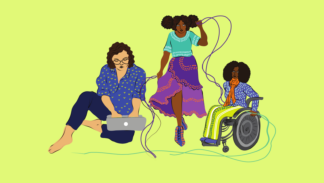UPDATE: Nepal rocked by second powerful earthquake, just weeks after quake that killed thousands
UPDATE MAY 12, 2015
“There are places where the people hear cries and weeping but no one can go there and rescue [people]. That is really painful. There are areas where nothing has reached. Helicopters cannot land…no one can walk there…landslides have taken communities down.” – Renu Rajbhandari, founder of the Women’s Rehabilitation Centre, a Global Fund for Women grantee partner in Nepal
Just weeks after a powerful earthquake in Nepal leveled villages and killed over 8,000 people, another devastating earthquake with a 7.3 magnitude rocked the country on Tuesday. Dozens of deaths and over 1,000 injuries have been reported as a result of this second quake.
Global Fund for Women is in touch with our grantee partners on the ground who are trying to rebuild during this crisis. “I was at Betrawati, bordering Rasuwa and Nuwakot, in a camp talking with mothers with newborn babies when the earth shook. Two landslides took place in front of my eyes, and the sky was full with dust,” says Renu Rajbhandari, founder of the National Alliance of Women’s Human Rights Defenders in Nepal and Women’s Rehabilitation Center, a Global Fund for Women grantee partner organization.
This second quake will further hamper already challenging relief efforts, and leaves relief workers and the people of Nepal filled with uncertainty. “I can’t express the feeling of this particular time. From Kathmandu, life looked normal, but since I returned to more remote areas, life is not the same. There are no trace of villages [that once existed]. It’s terrifying,” says Rajbhandari. “Staff are tired, physically and psychologically, and we don’t know how long it will continue. We will try our level best to help people right now. We are running 25 safe spaces for women in different areas, in spite of us being unsafe.”
Grantee partner organization Shakti Samuha says they are also dealing with fear and uncertainty. “We all on the Shakti Samuha team are safe, but it is a very horrible moment for us. Some of our colleagues were in Sindhupalchowk [where there were many landslides from the previous quake], so we were so worried for them, but I just talked with them and they are safe,” says a Shakti Samuha representative. “The death toll has already reached 55. We are so worried for everyone and praying for all people. This is such a critical time. People were starting to feel little bit more secure and safe but after we felt [the second] earthquake we are so scared.”
Global Fund for Women will continue to provide crisis support to some of our long-standing grantee partners—trusted women-led groups in communities in Nepal and India that address the unique needs of women and girls during the rebuilding efforts.
UPDATE APRIL 30, 2015
As the death toll continues to climb past 5,000 in Nepal following the 7.8-magnitude earthquake that hit on Saturday, Global Fund for Women is standing in solidarity with women on the ground who are fearlessly leading rescue efforts in the face of this devastation.
“We are counting deaths – the government figure is 4,600 but it is much more than that because there are areas that have been swept away, with no houses and no rescue teams in reach,” said Renu Rajbhandari on Wednesday. She founded the National Alliance of Women’s Human Rights Defenders in Nepal, and is also the founder of the Women’s Rehabilitation Centre, a Global Fund for Women grantee partner which has been working to advance women’s rights in Nepal since 1991.
“For the last two days, it’s been pouring and because of the weather and the geographical conditions, the rescue teams are finding it even more difficult to get [to these badly hit areas],” continued Rajbhandari. “On top of that, government is badly coordinated so a lot of international volunteers are there but have not been properly mobilized.”
The United Nations reports that at least eight million people have been affected by the earthquake – more than a quarter of Nepal’s population. Aftershocks – more than 42, according to recent data – continue to block relief efforts and cause more damage: a powerful 6.4-magnitude aftershock was felt on Sunday in Nepal, India, and Bangladesh, and several avalanches have been reported near Mount Everest.
“We are still reeling in shock and [many] have slept out of their homes in cars, in the gardens, or in public places,” said Sadhana Shrestha, Executive Director of Tewa, a Global Fund for Women grantee partner in Nepal with deep roots investing in women’s rights groups there since 1996. “There is extreme destruction and devastation.”
Women are taking the lead following the disaster
In the face of this disaster, Global Fund for Women’s partners are already responding to the needs of women and children in Nepal and India. Our partners – local, women-led groups – are deeply rooted in the communities they serve. They know the specific needs of women after a crisis – needs that most relief efforts overlook, such as supplying sanitary napkins, milk and food for babies and children, or safe shelters for single women and their families.
“This is the time for us women to take the lead,” said Rajbhandari, who has been instrumental in advancing women’s human rights in Nepal, especially in times of crisis. “It’s a difficult moment but in difficulties, women have always proven that when we take the lead, we manage things better, and in Nepal we are trying to do that.”
The most critical need in Nepal right now is shelter, according to our partners, as conditions worsen for the millions of people who have been displaced by the earthquake and its aftershocks. Many families are staying in very basic tents with little shelter at makeshift camps.
“The situation at the camps where people have been living in open grounds is not so appealing,” explained Lily Thapa, founder of Global Fund for Women grantee partner Women for Human Rights in Nepal which has been advancing women’s rights in 73 districts in Nepal for 19 years. “While a few camps are well organized, others are crowded with thousands of people – hundreds living under one tent. The rain, wind and waste makes the situation even worse.”
Thapa and the Women for Human Rights team are visiting camps around Kathmandu and affected areas to determine immediate needs, highlighting that the camps have a “major shortage of water, waste management, tents, lights, [and] emergency medicines”.
Tewa’s staff and volunteers are also distributing relief packages, water purifiers, masks, and sanitary napkins to the outskirts of Kathmandu and surrounding areas of Bungamati, Sankhu, Lubu, and Khokana.
Focusing on the unique needs of women
“One of our children’s shelters and our women’s shelter has cracks. The women in the shelter – some lactating, some heavily pregnant, and some physically burnt and injured – lack proper medical care and services,” explained Bandana Rana, Executive Chair of Global Fund for Women grantee partner Saathi (‘friend’ in Nepali), which has been advancing women’s rights in Nepal for over 20 years. “We have yet to assess the situation of the communities we work in as we have not been able to be in touch with them due to communication problems.”
Tewa is also working with women at makeshift camps who are in the process of birthing, nursing, or post-natal and prenatal care to direct them to the places where they can receive proper care and support.
Indeed, the needs of pregnant women and new mothers and their children are often overlooked in times of crisis. In Nepal, UNFPA now estimates some 2 million women and girls of reproductive age are among those affected by the earthquake– including some 126,000 pregnant women.
Women for Human Rights and Women’s Rehabilitation Centre are among Global Fund for Women’s many partners who are working to help pregnant women and new mothers and their families, as well as elderly women who are among the most vulnerable.
This need for shelter in Nepal includes, especially, safe spaces for women and girls. “We have started three women’s safe spaces in Kathmandu…and together with two hospitals, we have started a community kitchen [with] special food for babies and special care for women who have just delivered babies,” explained Rajbhandari of the efforts Women’s Rehabilitation Centre and the National Alliance of Women’s Human Rights Defenders are leading together with other women-led groups.
Women’s groups urgently need money to continue their work
Global Fund for Women is acting quickly to provide crisis support to some of our long-standing grantee partners like Saathi, Tewa, Women’s Rehabilitation Centre, and Women for Human Rights, among many others – trusted women-led groups in communities in Nepal and India that have been hardest hit by the earthquake and powerful aftershocks. The money will help address these most immediate needs they are identifying, as well as long-term efforts to rebuild their communities.
“Women-led organizations have very small overhead and we try for every single piece to go to the community,” explained Rajbhandari, adding a plea to “please support women’s rights groups” in Nepal.
These grassroots women’s groups will continue to lead in their communities and ensure women’s rights long after the current crisis is over. For instance, following disasters and during times of rebuilding, violence against women sadly often intensifies. “Until now, we haven’t seen any sexual violence but we need to start taking care of that because once things calm down, we know that women have to stay in the camps…and in the camps, sexual violence and other kinds of violence can take place,” said Rajbhandari.
Local women leaders also ensure that women’s voices are heard and that they play an essential role in the relief and recovery efforts, including in decision-making where women are often excluded.
“While women are at the frontline of disaster impact and response due to their role in looking after children, elders and community members. Yet they are often excluded from decision-making in immediate and long term recovery efforts,” said Jane Sloane, Vice President of Programs at Global Fund for Women. “Women need to be front and center in decision-making and action.”
Global Fund for Women’s grantee partners urgently need support in order to address the needs of their communities and work to immediately fill gaps in relief efforts to ensure long-term recovery – especially for women and their families.
Our partners have already noted the dire need for money to continue their important work. “We are working our best to distribute tents, blankets, and sanitation packages but lack of funds has limited our reach to victims first hand,” expressed Rama Ale Magar, Program Director and Chairperson of the Himalayan Grassroots Women’s Natural Resource Management Association (HIMAWANTI), a Global Fund for Women grantee partner that empowers rural Nepali women through sustainable resource management.
“Damages are beyond reparable, but we can still do our bit,” urged Thapa. “Give shelter to those in need, share your food, share water, give hands, donate money, donate blood, donate clothes, and pray together.”
Please give generously today to help women who have survived the devastating earthquake in Nepal.



